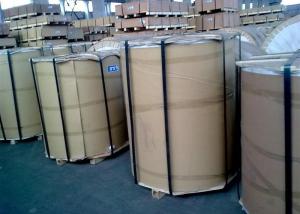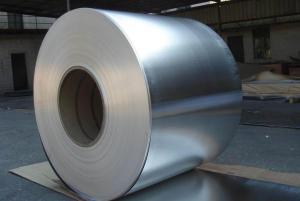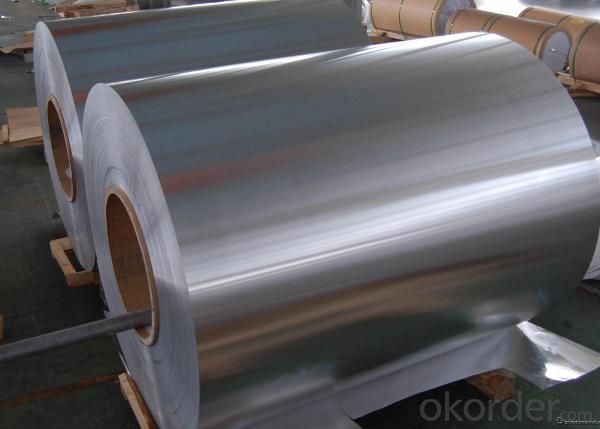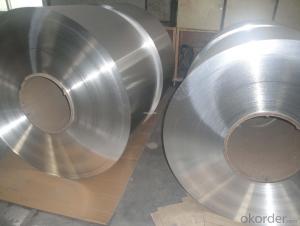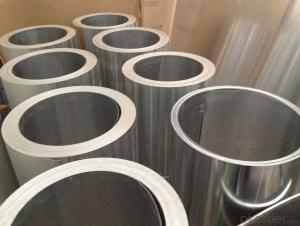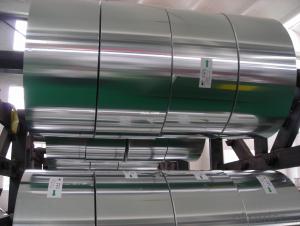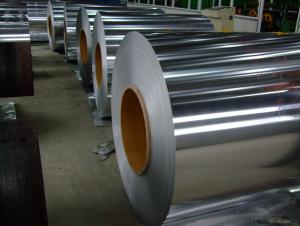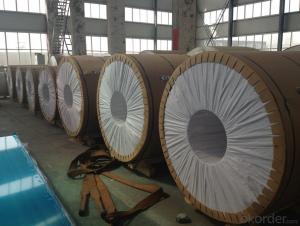High Quality 14 Aluminum Coil Grey Made in China
- Loading Port:
- China main port
- Payment Terms:
- TT or L/C
- Min Order Qty:
- 3 m.t.
- Supply Capability:
- 10000 m.t./month
OKorder Service Pledge
OKorder Financial Service
You Might Also Like
1. Specifications of Aluminum Coil
| Alloy Number | AA1xxx (AA1050, AA1060, AA1070, AA1100 etc.) AA3xxx (AA3003, AA3004, AA3005, AA3105 etc.) AA5xxx (AA5052, AA5083, AA5754 etc.) AA8xxx (AA8011, AA8006 etc.) |
| Temper | H14, H16, H18, H22, H24, H26, H32, O/F |
| Thickness | 0.2mm - 100mm |
| Width | 10mm- 2200mm |
| Standard | Standard: GB/T 3880-2006 |
Special Specification is available on customer’s requirements
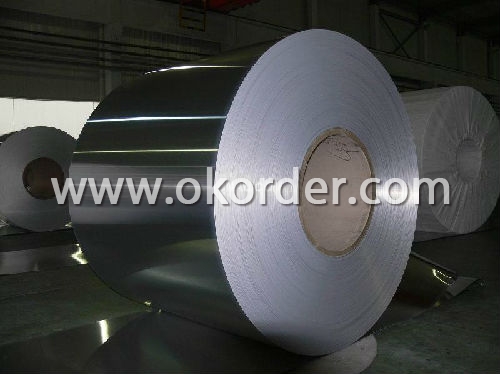
2. Usage/Applications of Aluminum Coils AA3003
Aluminum Coils has a wide variety of uses in the construction industry including aluminium siding and roofing. Sheet is also used widely in construction, decoration, transport applications and other various industrial filed, such as automobile body panels, airframes, curtain walls and the hulls of boats etc.
3. Packaging & Delivery of Aluminum Coils AA3003
Packaging: Seaworth package, water-proof paper wrapped inside, carton wrapped outside in wooden pallets.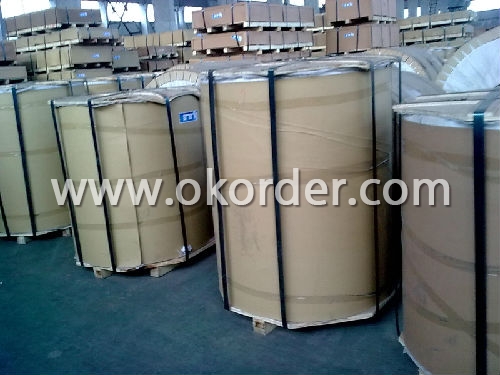
- Q: Can aluminum coils be used in food processing industries?
- Yes, aluminum coils can be used in food processing industries. Aluminum is non-toxic, lightweight, and has excellent conductivity, making it suitable for various applications in the food industry. It is commonly used in food packaging, cooking utensils, and equipment, including heat exchangers and refrigeration units. Additionally, aluminum coils are corrosion-resistant and easy to clean, making them a safe and hygienic choice for food processing.
- Q: This question asks about the environmental friendliness of aluminum coils.
- <p>Aluminum coils are considered environmentally friendly for several reasons. They are highly recyclable, with the recycling process requiring significantly less energy compared to producing new aluminum. This reduces greenhouse gas emissions and conserves resources. Additionally, aluminum is a non-toxic material that does not leach harmful substances into the environment. However, the environmental impact also depends on the production process, which can consume energy and generate emissions. Overall, when properly recycled, aluminum coils have a lower environmental footprint than many other materials.</p>
- Q: What are the different coil recoiling options available for aluminum coils?
- There are several coil recoiling options available for aluminum coils, depending on the specific requirements and desired outcomes. One option is the oscillate recoiling method, which involves winding the aluminum coil in a zigzag pattern. This technique helps to reduce coil set and improve flatness, making it suitable for applications where a flat, smooth surface is crucial. Another option is the traverse winding method, which involves winding the aluminum coil back and forth in a controlled manner. This technique helps to evenly distribute the tension across the coil, reducing the risk of coil breaks and ensuring consistent performance. Additionally, there are options for coil slitting and rewinding. Slitting involves cutting the aluminum coil into narrower strips, which can be rewound into smaller coils. This option is commonly used when smaller coil sizes are required for specific applications. Furthermore, some recoiling options include coil rewinding with tension control systems. These systems ensure that the tension applied during rewinding is controlled and consistent, helping to prevent overstretching or deformation of the aluminum coil. Overall, the choice of coil recoiling options for aluminum coils depends on factors such as the desired surface finish, coil size requirements, and specific application needs. Manufacturers and processors of aluminum coils can provide guidance and expertise in selecting the most suitable recoiling option based on these considerations.
- Q: This question seeks to understand the various types of aluminum coils that are commonly found in the market.
- <p>Aluminum coils available on the market today can be categorized based on their properties and applications. These include: 1. Plain Aluminum Coils: Used for general purposes like packaging and construction. 2. Embossed Aluminum Coils: Feature a textured surface, used in decorative applications. 3. Alloy Aluminum Coils: Made from a mixture of aluminum and other metals for enhanced strength or corrosion resistance. 4. Color Coated Aluminum Coils: Coated with paint or plastic for aesthetic or protective purposes. 5. Heat Treated Aluminum Coils: Processed to improve their mechanical properties. 6. Mirror Finish Aluminum Coils: Have a highly reflective, polished surface. 7. Pre-painted Aluminum Coils: Coated with a layer of paint before being used in construction or other applications. Each type serves specific industries and applications, with variations in thickness, width, and alloy composition.</p>
- Q: Why does the heat preservation aluminum roll bend when it is cooled?
- Insulation aluminum coil will appear when the cooling bending phenomenon, reason is generally under the conditions of air cooling, the heat transfer coefficient of the aluminum coil insulation parts in contact with the air were flat, but because the wall thickness or different shapes, different parts of the heat dissipation rate is not balanced, resulting in thick wall or hollow tube heat faster than the thin Department of slow, resulting in insulating aluminum roll cooling occurs to the hollow part or thick walled parts of the twists and turns of the phenomenon.
- Q: How are aluminum coils installed in various applications?
- Aluminum coils are installed in various applications using different methods depending on specific requirements and the nature of the application. Here are a few commonly used methods for aluminum coil installation: 1. HVAC Systems: Aluminum coils are commonly used for heat transfer in HVAC systems. They are typically installed inside air handling or condensing units. Installation involves securing the coils, connecting them to refrigerant lines, and ensuring proper insulation and sealing to prevent leaks. 2. Refrigeration: Aluminum coils are used for heat transfer and cooling in refrigeration systems. They are usually installed within evaporator or condenser units. The installation process includes securely mounting the coils, connecting them to refrigerant lines, and ensuring proper insulation and sealing. 3. Heat Exchangers: Aluminum coils are widely used in heat exchangers for various industrial applications. They are installed within shell and tube or plate and frame heat exchanger units. Installation involves positioning the coils, connecting them to piping and fittings, and ensuring proper alignment and sealing. 4. Automotive Radiators: Aluminum coils are extensively used in automotive radiators for efficient heat dissipation. Installation involves mounting the coils within the radiator assembly, connecting them to coolant lines, and ensuring proper alignment and sealing to prevent leakage. 5. Electrical Transformers: Aluminum coils are used for efficient power transmission and electrical insulation in electrical transformers. Installation involves winding the coils around the transformer core, connecting them to terminals, and ensuring proper insulation and grounding. In all these applications, it is essential to adhere to industry standards and guidelines to achieve proper aluminum coil installation. This includes considering factors such as structural support, alignment, connection integrity, insulation, and sealing to ensure optimal performance and longevity.
- Q: Can aluminum coils be used for electrical enclosures?
- Yes, aluminum coils can be used for electrical enclosures. Aluminum is a lightweight and durable material that provides excellent electrical conductivity and heat dissipation properties. It also has good corrosion resistance, which makes it suitable for various environmental conditions. Aluminum coils can be easily formed into different shapes and sizes, making them versatile for enclosure designs. Additionally, aluminum is a cost-effective option compared to other metals like stainless steel. However, it is important to ensure proper insulation and grounding when using aluminum coils for electrical enclosures to prevent any electrical hazards.
- Q: Can aluminum coils be used for window frames?
- Yes, aluminum coils can be used for window frames. Aluminum is a popular choice for window frames due to its durability, lightweight nature, and resistance to corrosion. It is commonly used in both residential and commercial applications. Aluminum coils can be easily shaped and manipulated to fit various window sizes and styles. Furthermore, aluminum frames offer excellent thermal insulation properties, which can help improve energy efficiency in buildings. Overall, aluminum coils are a reliable and practical option for window frame construction.
- Q: What are the common sizes of aluminum coils used in roofing?
- The sizes of aluminum coils commonly utilized in roofing can differ depending on the specific project's needs and requirements. Some well-liked sizes include widths of 24 inches, 36 inches, and 48 inches. These sizes are frequently selected due to their compatibility with standard roofing systems and their efficient coverage of a large surface area. Furthermore, the thickness of the aluminum coil can also vary, ranging from 0.019 inches to 0.032 inches. Ultimately, the size of the aluminum coil employed in roofing will be contingent upon factors such as the roof's size, desired aesthetic, and local building codes and regulations.
- Q: Are aluminum coils prone to corrosion?
- Yes, aluminum coils are prone to corrosion. Aluminum is a reactive metal that tends to oxidize when exposed to oxygen and moisture, leading to the formation of a layer of corrosion on the surface of the coil. However, this can be mitigated by applying protective coatings or using alloys that are more resistant to corrosion.
1. Manufacturer Overview
| Location | Henan, China |
| Year Established | 1996 |
| Annual Output Value | Above US$200 Million |
| Main Markets | Mid East;Eastern Europe;North America |
| Company Certifications | ISO 9001:2000;ISO 14001:2004;OHSAS 18001 |
2. Manufacturer Certificates
| a) Certification Name | |
| Range | |
| Reference | |
| Validity Period |
3. Manufacturer Capability
| a) Trade Capacity | |
| Nearest Port | Shanghai |
| Export Percentage | 30%-50% |
| No.of Employees in Trade Department | 21-50 People |
| Language Spoken: | English;Chinese |
| b) Factory Information | |
| Factory Size: | Above 100,000 square meters |
| No. of Production Lines | Above 10 |
| Contract Manufacturing | OEM Service Offered;Design Service Offered |
| Product Price Range | Average |
Send your message to us
High Quality 14 Aluminum Coil Grey Made in China
- Loading Port:
- China main port
- Payment Terms:
- TT or L/C
- Min Order Qty:
- 3 m.t.
- Supply Capability:
- 10000 m.t./month
OKorder Service Pledge
OKorder Financial Service
Similar products
Hot products
Hot Searches
Related keywords

